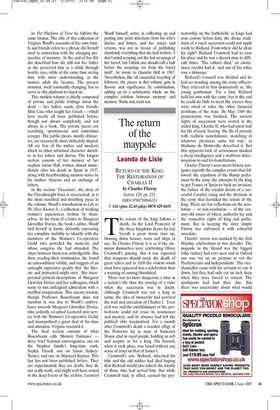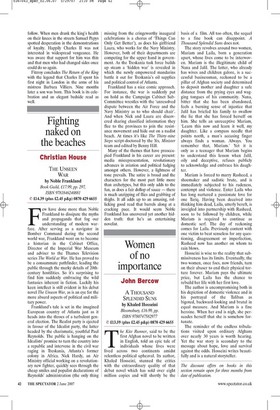The return of the maypole
Leanda de Lisle RETURN OF THE KING: THE RESTORATION OF CHARLES II by Charles Fitzroy Sutton, £20, pp. 252, ISBN 9780750946353 © £16 (plus £2.45 p&p) 0870 429 6655 The return of the king follows a death. As the Lord Protector of the three kingdoms draws his last breath a great storm rises up, blowing down houses, trees and ships at sea. To Charles Fitzroy it is as if the elements themselves were celebrating Oliver Cromwell's passing. But it was expected that tempests should mark the death of great rulers and in 1658 the violent winds must have appeared less a celebration than a warning of coming bloodshed.
There was no more dangerous a time in a nation's life than the passing of a ruler when the succession was in doubt. Although Cromwell was not a king in name, the idea of monarchy had survived the trial and execution of Charles I. Even civil war and the establishment of the protectorate could not erase its resonances and mystery, and its absence had left the political elite traumatised. For a month after Cromwell's death a wooden effigy of the Protector lay in state at Somerset House clad in royal purple, holding an orb and sceptre as for a king. His funeral, when it took place, was based without any sense of irony on that of James I.
Cromwell's son, Richard, inherited his title and the old soldier had died hoping that Richard would also inherit the loyalty of those who had served him But while Cromwell had, in effect, earned the protectorship on the battlefield, as kings had won crowns before him, the divine traditions of a royal succession could not apply easily to Richard. From where did he draw his right? Richard Cromwell had to earn his place and he was a decent man in difficult times. 'The vulture died,' an anonymous royalist had it, 'and out of his ashes rose a titmouse.'
Richard's Council was divided and he had no standing among the army officers. They referred to him dismissively as, `the young gentleman'. For a time Richard held his own with the army, but in the end he could do little to meet the arrears they were owed or solve the other financial problems of the state. By May 1569 the protectorate was finished. The ancient rights of succession were vested in the exiled king, Charles II, who had spent half his life abroad, bearing `the ills of poverty with reckless nonchalance, snatching at whatever pleasures came his way', as Madame de Motteville described it. But this apparent lack of seriousness masked a sharp intelligence and a stubborn determination to end his humiliations.
Charles Fitzroy's neat micro-history navigates expertly the complex events that followed: the expulsion of the Rump parliament by the army, the attempts by the king to get France or Spain to back an invasion, the failure of the royalist dream of a successful Cavalier rising and the divisions in the army that heralded the return of the king. There are few reflections on the resolution — or non-resolution — of the century-old issues of where authority lay and the respective rights of king and parliament. But in keeping the story simple Fitzroy has enlivened it with colourful anecdote.
Charles' return was marked by the first Mayday celebrations in two decades. The maypole in the Strand was the biggest John Aubrey had ever seen and in Oxford one was 'set up on purpose to vex the Presbyterians and Independents'. The vicechancellor came with his servants to saw it down, but they had only cut an inch deep when they were forced to retreat. The spoilsports had had their day. But there was uncertainty about what would follow. When men drank the king's health on their knees in the streets Samuel Pepys spotted desperation in the demonstrations of loyalty. Happily Charles II was not interested in widespread vengeance. He was aware that support for him was thin and that men who had changed sides once could do so again.
Fitzroy concludes The Return of the King with the legend that Charles II spent his first night in London in the arms of his mistress Barbara Villiers. Nine months later a son was born. This book is its celebration and an elegant bedside read as well.





















































 Previous page
Previous page